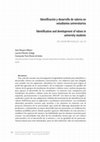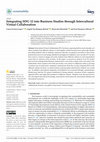Papers by Iciar Elexpuru Albizuri
Frontiers in psychology, May 30, 2024
Proyecto Hombre: revista de la Asociación Proyecto Hombre, 2008
INTED2014 Proceedings, 2014
DOAJ (DOAJ: Directory of Open Access Journals), Mar 1, 2011

This article summarizes a longitudinal research project to identify and develop values in univers... more This article summarizes a longitudinal research project to identify and develop values in university students. The aims of the study were: to identify the values needed to achieve the graduate student profile the university hoped to promote; to compare student value profiles at the beginning and end of their time at university; and to develop a series of proposals aimed at comprehensive development in students. The study involved a sample of first-and last-year students pursuing nine degrees at a Spanish university and scheduled to graduate in 2005. Data were collected and analysed by means of a validated version of the Hall-Tonna inventory of values adapted for application to university students. The results identify student values in relation to the values the university's programmes aim to promote, teacher leadership styles demanded by students and the teacher leadership style that best enables development towards autonomy and cooperation. The results may also be used to anticipate difficulties in this process and to map out areas that might be improved and the skills students need in order to progress. The highest student priorities are related to self development and the equality of human beings. Students are interested in keeping well informed, but knowledge orientation and research are not their highest priorities. Students are concerned with the search for meaning in their lives and experience some difficulties in making social and ethical commitments. They need to develop interpersonal and system comprehension skills. Teacher leadership demands are diverse, ranging from dependence to autonomy and cooperation. Based on the results of the study, actions plans and proposals were designed taking into account the academic staff 's role in promoting the development of student values from their actual profiles to the desired profiles.
Libro de Actas del 3rd International Congress of Educational Sciences and Development, 2015, ISBN 978-84-606-6429-1, pág. 506, 2015
REDU. Revista de Docencia Universitaria, 2009
Este artículo recoge los fundamentos teóricos en los que se basa el diseño del Plan de Formación ... more Este artículo recoge los fundamentos teóricos en los que se basa el diseño del Plan de Formación y Desarrollo del profesorado diseñado para la incorporación del Modelo de Formación de la Universidad de Deusto. Describe su estructura, así como la planificación, desarrollo y resultados de la evaluación de dicho Plan en cada una de sus tres fases. Se plantean reflexiones sobre la experiencia e implicaciones para el futuro.
Palgrave studies in adult education and lifelong learning, 2023
Pensando la comunicación: reflexiones y debates en un mundo hiperconectado.
International Journal of Instruction
Despite the abundance of the literature reflecting peer facilitators' short-term gains, the long-... more Despite the abundance of the literature reflecting peer facilitators' short-term gains, the long-term merits of once acting as a peer facilitator still represent a blank space in the academic literature. This retrospective qualitative case study employs Personal Meaning Maps and semi-structured interviews to explore five former peer facilitators' narratives to elicit any long-term perceived value of once acting as a peer facilitator in a peer-led multicultural self-study group. Utilizing the content dimension of learning framework, the study concludes that the former peer facilitators perceive a wide range of long-term benefits such as the consolidation of knowledge, the development of skills and competencies, and a positive impact on their personal growth and professional identity.

Sustainability
Intercultural Virtual Collaboration (IVC) has been a growing field in recent decades as it allows... more Intercultural Virtual Collaboration (IVC) has been a growing field in recent decades as it allows students from different cultures to work together without having to move physically. Besides providing students with an authentic experience that they are going to encounter in their future professional careers in increasingly globalised and digitised workplaces, more recently, IVC has also been used as a means to engage university students from different cultures in social and political issues that are common across societies. In this paper, we present an analysis of an IVC project that involved undergraduate Business students from a university in Spain and a university in the Netherlands where students from both universities were asked to collaborate online to develop a business case to analyse how companies communicate about the way they integrate SDGs in the different cultures involved. A content analysis of group reports delivered by students was carried out. In addition, intercult...

Espacios de aprendizaje en el ámbito universitario actual: oportunidades para el desarrollo de competencias e implementación de buenas prácticas docentes innovadoras, 2018, ISBN 978-84-271-4244-2, págs. 229-235, 2018
La práctica llevada a cabo forma parte de la tesis doctoral de Luana Ferreira-Lopes, que está sie... more La práctica llevada a cabo forma parte de la tesis doctoral de Luana Ferreira-Lopes, que está siendo dirigida por las profesoras Marijose Bezanilla e Itziar Elexpuru Albizuri. La investigación propone una secuencia de tareas telecolaborativas que puede ser adaptada e incorporada al programa de diferentes asignaturas en distintas áreas académicas en Educación Superior. El objetivo es promover la adopción de la telecolaboración como estrategia para el desarrollo de la Competencia Intercultural al entregar a los profesores un material concreto, que facilite la integración de dicha práctica en el currículum universitario. La Buena Practica ha sido implementada en dos cursos de la Deusto Business School y ha mostrado ser eficaz al desarrollar la Competencia Intercultural de los alumnos participantes y ha obtenido un alto nivel de satisfacción por parte de los estudiantes, de los profesores y de los administradores de los programas participantes.
Avances en la innovación universitaria: tejiendo el compromiso de las universidades, 2012, ISBN 978-84-271-3430-0, págs. 721-729, 2012
The impact of the Erasmus programme on mobility and employability, 2014, ISBN 9788379694310, págs. 45-60, 2014
Journal for the Study of Education and Development, Infancia y Aprendizaje, 2017
El futuro del educador: perfiles profesionales y adaptación de los pedagogos y educadores sociales a una sociedad en cambio: Actas de las I Conversaciones Pedagógicas de la Universidad de Deusto. Bilbao, 16 y 17 de abril de 2002, 2002, ISBN 84-7485-849-6, págs. 27-42, 2002
Prosumidores emergentes: redes sociales, alfabetización y creación de contenidos, 2021, ISBN 978-84-1377-586-9, págs. 20-47, 2021

Journal of International Education in Business, 2021
Purpose Allowing for interaction with foreign cultures without the need to travel, intercultural ... more Purpose Allowing for interaction with foreign cultures without the need to travel, intercultural virtual collaboration represents a potential tool to develop business students’ intercultural competence. This study aims to explore students’ perceptions towards the implementation of a research-based task sequence in a project in which undergraduate Business students from Spain collaborated virtually with undergraduate business students from The Netherlands during a semester. More specifically, this paper investigates what intercultural competence indicators were mostly developed by the sequence implemented; how much each task from the sequence in question developed different intercultural competence indicators; and how much students enjoyed participating in each task. Design/methodology/approach Data was collected through after-task reflection questionnaires. A quantitative analysis of Likert-type questions was carried out and open-ended responses were used to illustrate findings. Fin...

Infancia y Aprendizaje, 2017
Abstract Using a sample of 464 adolescents from Vizcaya, Spain, the aim of this study is to ident... more Abstract Using a sample of 464 adolescents from Vizcaya, Spain, the aim of this study is to identify and analyse the values they perceived from their favourite TV character. The data were collected in person by means of two instruments: the Val-TV 0.2 questionnaire, based on the Schwartz model, and a personal essay, out of which 50 were randomly selected, to identify values perceived through the analysis of the essays, based on the Hall-Tonna model. The quantitative results show that adolescents perceive values related to hedonism, benevolence and self-direction in their favourite TV character. These values could be associated with qualitative values related to fun, belonging and the search for one’s own autonomy. The values perceived to a lesser extent from both perspectives are related to security, conformity and tradition. The conclusions support the relevance of the Hall-Tonna model for improving the understanding of values perceived by adolescents through the medium of television.

Uploads
Papers by Iciar Elexpuru Albizuri